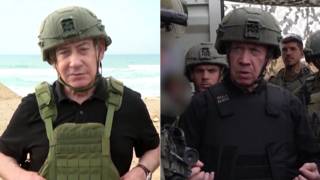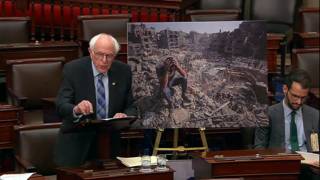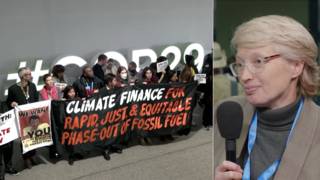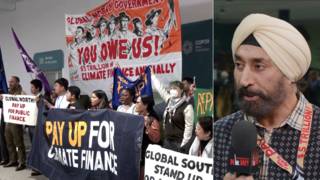HeadlinesNovember 17, 2014
ISIS Beheads U.S. Aid Worker Peter Kassig
The Islamic State militant group has beheaded U.S. aid worker Peter Kassig. A video released Sunday shows a mass beheading of Syrian soldiers, followed by an image of Kassig’s severed head. Unlike four previous videos involving American and British hostages, this video does not show the actual execution or any statement by Kassig. The shift has caused speculation Kassig may have resisted and managed to disrupt the filming. Kassig, who was 26, converted to Islam in captivity and was also known as Abdul-Rahman. He was an Army Ranger who served in Iraq and later founded an aid group to help Syrian refugees. President Obama called his killing “pure evil.”
Top U.S. General Makes Surprise Visit to Iraq
The top U.S. military officer, Chair of the Joint Chiefs of Staff General Martin Dempsey, made a surprise trip to Iraq over the weekend. His trip came two days after he told a House panel he was considering sending combat troops back to Iraq.
Report: Only 3% of Mainstream TV News Guests Opposed War
A new analysis of mainstream TV news has found there was almost no debate about whether the United States should go to war in Iraq and Syria. The group Fairness and Accuracy in Reporting, or FAIR, found that of the more than 200 guests who appeared on network shows to discuss the topic, just six voiced opposition to military action. On the high-profile Sunday talk shows, out of 89 guests, there was just one antiwar voice — Katrina vanden Heuvel, editor of The Nation.
Afghanistan: Female Lawmaker Survives Attack; U.S. Soldier Killed
In Afghanistan, a female Parliament member has survived an assassination attempt. Shukria Barakzai was wounded and three other people, including a young girl, were killed in the suicide blast. In a separate incident, a U.S. soldier, Sgt. 1st Class Michael Cathcart, was killed in Kunduz Province, reportedly from small arms fire.
Burkina Faso: Interim President Chosen After Military Takeover
In Burkina Faso, a former foreign minister has been tapped to lead the country’s transition to elections following a military takeover. The army seized power last month after mass protests that ended the 30-year rule of President Blaise Campaoré. Michel Kafando will serve as interim president until elections within the next year.
Texas: Chemical Leak at DuPont Plant Kills 4 Workers
In Texas, federal investigators have launched a probe after a toxic chemical leak killed four workers at a DuPoint plant. The workers were killed by a leak of methyl mercaptan, which is used to make insecticides. Plant manager Randall Clements said the cause is unknown.
Randall Clements: “It’s with deep regret that I’m here today to inform you that today we lost four of our family members from the La Porte site. We had the incident this morning that resulted in the exposure of five employees, four of which were fatally exposed. The fifth is in the hospital, expected to make a full recovery. He’s merely [there] for observations. We will continue to cooperate with all the local authorities and make sure that we investigate this fully, and we will find the cause.”
House OKs Keystone XL Pipeline; Senate to Vote This Week
House lawmakers have passed legislation to approve the Keystone XL pipeline, which would bring carbon-intensive tar sands oil from Alberta, Canada, to the Texas Gulf Coast. The Senate is expected to vote on the pipeline this week. We will have more on Keystone XL later in the broadcast with journalist and author Naomi Klein.
Empty Oil Train Derails in Casselton, Site of Previous Crash in North Dakota
Another crude oil train has derailed in Casselton, North Dakota. The town was the site of a prior derailment in December when a train carrying volatile oil from the Bakken Shale caught fire, prompting the evacuation of half the town. This time the oil cars were empty, so there was no explosion.
Oil Firms Halliburton, Baker Hughes to Merge in $34.6 Billion Deal
Halliburton has agreed to buy Baker Hughes in a $34.6 billion deal that will see the two major oil companies merge. The new company will keep the name Halliburton and be led by current Halliburton CEO David Lesar.
State Department Shuts Down Email After Breach
The State Department has shut down its email system in an unprecedented move following a data breach. The breach follows similar attacks announced in recent weeks at the White House, Postal Service and National Oceanic and Atmospheric Administration.
Japan: Okinawa Voters Choose Governor Opposed to U.S. Base
In Japan, voters on the island of Okinawa have elected a new governor who opposes the construction of a new U.S. military base. Takeshi Onaga, a former mayor, has ousted the current governor, Hirokazu Nakaima, who was backed by Japan’s ruling party. Nakaima supported plans to move Futenma airbase to a new, state-of-the-art facility. But Onaga says the base should be expelled from the island. Okinawa is home to about two-thirds of the 50,000 U.S. troops stationed in Japan. For decades, residents have called for the expulsion of U.S. troops, citing environmental concerns and sexual assaults.
Leaders Cite Progress on Climate at G20; Putin Leaves Early amid Ukraine Criticism
World leaders have wrapped up the G20 summit in Brisbane, Australia, where climate change topped the agenda. President Obama unveiled a $3 billion pledge to help poorer countries deal with global warming, a move Friends of the Earth called “a step in the right direction [that] falls far short of what is actually needed.” French President François Hollande said leaders made progress ahead of next month’s U.N. climate summit in Lima, Peru.
President François Hollande: “Lima, the location of the next climate change conference, will be a very important step, and the G20 enabled this step to be achieved before we all meet in Paris to sign the global agreement, which gives a chance for our planet to avoid warming that could reach 3 or 4 degrees Celsius according to the Intergovernmental Panel on Climate Change experts, which could trigger disasters and even wars. A way to avoid conflicts and disasters is to make decisions.”
Russian President Vladimir Putin left the G20 summit early amidst criticism over Russia’s involvement in Ukraine.
Bhopal Gas Leak Victims Win Victory After Hunger Strike
In India, victims of the deadly Bhopal gas leak have won a victory just weeks before the disaster’s 30th anniversary. Five women launched a hunger strike last week to demand the Indian government expand its compensation claim against Union Carbide over the catastrophic leak at its pesticide plant. Amnesty International says an Indian official agreed to demands including a revision of the government’s claim only about 5,000 people were killed and another 5,000 disabled. Campaigners say the actual death toll is about 23,000, with more than half a million more poisoned. The toxic legacy continues to this day with Union Carbide and its current owner, Dow Chemical, refusing to pay for clean-up.
Report: U.S. Vastly Expands Use of Undercover Agents
A new report finds the federal government has vastly expanded its use of undercover agents, with officers from at least 40 agencies posing in roles ranging from welfare recipients to protesters. The New York Times reports the use of undercover officers has expanded to “virtually every corner of the federal government,” including the Department of Education, NASA and the Smithsonian. At the Supreme Court, police disguise themselves as student protesters at demonstrations over issues like abortion.
Video Shows Darren Wilson, Cop Who Shot Michael Brown, Arresting Man for Filming Him
In news from Ferguson, Missouri, newly released video footage shows the police officer who fatally shot unarmed African-American teenager Michael Brown threatening and arresting a resident for filming him last year. The video posted to YouTube shows Officer Darren Wilson after he arrived at a home to serve a summons. The resident asks his name, and Wilson threatens to “lock [his] ass up.”
Mike Arman: “What’s your name, sir?”
Darren Wilson: “If you wanna take a picture of me one more time, I’m gonna lock your ass up.”
Mike Arman: “Sir, I’m not taking a picture. I’m recording this incident, sir. Do I not have the right to record?”
Darren Wilson: “No, you don’t. Come on. Come on.”
Arman was then arrested.
Surveillance Footage Shows Claims of Darren Wilson’s Injuries “Exaggerated”
The St. Louis Post-Dispatch has released audio of police radio calls from the day Michael Brown was shot. It shows the fatal shooting took place in less than 90 seconds. The paper also released surveillance footage which shows Wilson leaving the police station for the hospital two hours after the shooting, then returning a few hours later. Attorneys for Brown’s family say it shows initial claims Wilson was injured in the encounter were “exaggerated.” A grand jury’s decision on whether to indict Wilson is due any day now.
Most popular
- 1
- 2
- 3
- 4
Non-commercial news needs your support
Please do your part today.











Media Options